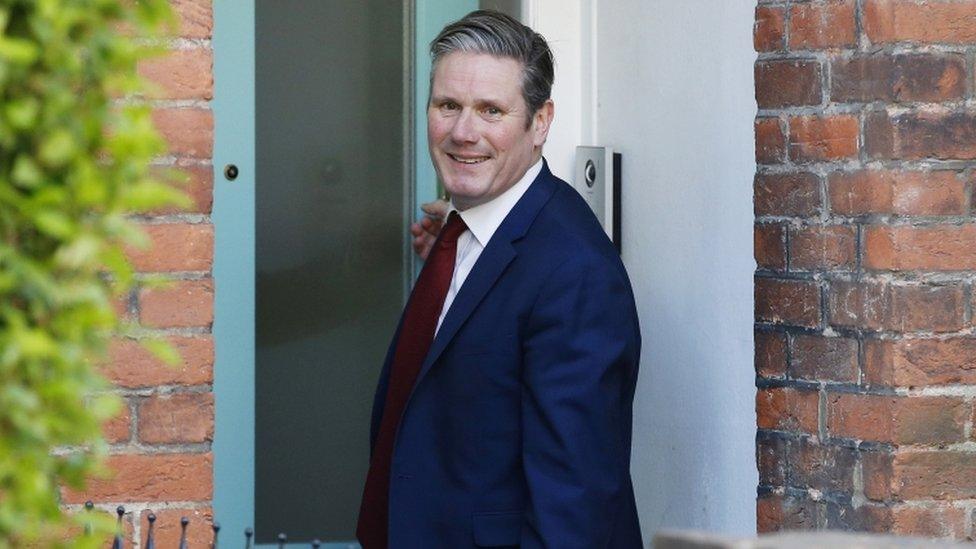The task facing Labour's new leader
- Published

He calls it "a mountain to climb". If he were more prone to colourful metaphor, Sir Keir Starmer might have admitted that the job ahead is more akin to crossing the Himalayas with a heavy bag, no oxygen and a sprained ankle.
Labour's brand new leader is picking up the pieces of a party that has been scrapping with itself for nearly five years, has fewer MPs than at any time since World War II, has squandered what was a highly effective political machine, failed to crack down fast enough when anti-Semitism festered, and lost touch with so many voters in parts of the country Labour used to regard as home.
It is true that Jeremy Corbyn excited many thousands of voters on the left and the membership of the party swelled. It is true too that he shifted Labour to take a firmer stance against austerity, which, after 10 years of a squeeze on the state, is where political gravity has moved too.
But Labour has just lost four general elections in a row. And however hard some of the departing leader's ardent devotees try to argue that he succeeded in some respects, that is a woeful record.
What map does the new leader intend to use as a guide? Through his campaign Sir Keir Starmer expounded a belief in what he called 'moral socialism'.
A hard concept for anyone, even vaguely on the left to object to. Hard, though, to translate into anything concrete to explain on the doorsteps of the country.
He was achingly careful during the leadership contest not to criticise the platform of the party's manifesto, just weeks after an agonising defeat. But he gave little away about the kinds of plans he might offer in four years' time in their place.
Even those who know him well sometimes struggle to ascribe a particular set of beliefs to him - somewhat to the right of Jeremy Corbyn certainly, somewhat to the left of Tony Blair; yes, that too.
In full: Sir Keir Starmer interview during the leadership election
In truth, many in the Labour Party tonight, at least, may not care that much, that for now his particular personal politics are something of a mystery - relieved at least that there has been an overwhelming victory for a politician they consider a principled pragmatist.
Firm ideologies have been the source of many Labour woes in the last few years, so competence and internal calm seem like real prizes.
Some MPs are keen for him to move the party to the centre, and fast. But there are warnings already from some like the campaign group Momentum and the leader of the Fire Brigades Union against swinging away from Jeremy Corbyn's platform.
One senior MP told me Sir Keir had spent the campaign saying he was a socialist, so now was time to practise what he had preached. Don't doubt though, that the scale of his win, including new elections to the party's ruling body, the NEC, means he has the power he needs over the party to run it as he sees fit. Big changes in the party's organisation are likely to come.
But after so much internal war, Sir Keir is likely to want to sue for peace, rather than spend time settling any scores. It's expected he'll err on the side of bringing fresh blood into his shadow cabinet, rather than bring back any household names whose experience might be valuable, but whose past might mean political baggage.
He has made plain today that he will be willing to "change where we need to change, rethink where we need to rethink" - in other words, I will be different - but it's likely he will try to move on respectfully, rather than tear up what's gone before.
Too timid for some? Maybe. You can't pretend the last few years of angst didn't happen. Or sensible in this moment? Perhaps that too.
Yet for every opposition leader, the biggest problem is seeming relevant, being noticed at all. That is especially the case when a government has a thumping majority. But the current crisis potentially changes that all.
We are in a moment where the country is looking to its leaders for answers, a time of deep anxiety, a health and economic emergency.
In this climate, that gives the official opposition both political opportunity, and a danger.
The government has taken on sweeping new powers, and vast new responsibility for swathes of our lives. It is struggling to manage some elements of a fast-moving crisis. Labour's new leader has the chance now to help, but also the chance to build his own reputation alongside.
And when the country has come through this pandemic, a day will come when the political environment will have been recast.
The Conservatives have just presided over a growth in government and public spending of epic proportion - they have reacted to an emergency - but the aftermath could be a moment where Labour can make a more persuasive case for the state.
While the arithmetic of the next election, four and half years away, looks at this distance to be almost impossible for Sir Keir's party, the rapidly changing contours of our politics mean that nothing is inevitable at all.
